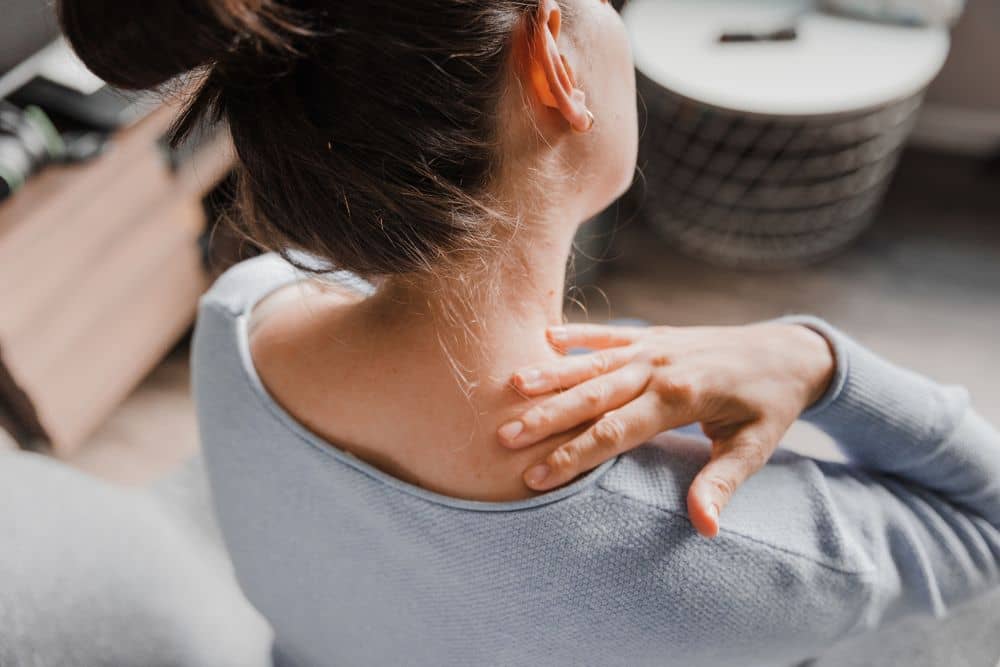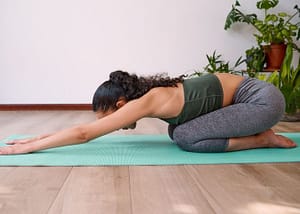How to Relieve Tension in the Neck and Shoulders from Anxiety

Anxiety doesn’t just live in your mind. It often shows up in your body, too. One of the most common ways it does this? Tightness across the neck and shoulders. If you’ve ever caught yourself rubbing the back of your neck during a stressful day, you know how physical stress can feel. At Mile High Psychiatry, we regularly see patients whose anxiety shows up as tension in the upper body, but we have tips on how to relieve tension in the neck and shoulders from anxiety.
Why Does Anxiety Cause Tension in the Neck and Shoulders?
Anxiety triggers the body’s “fight or flight” response, a natural reaction designed to protect you from danger. While this response can be helpful in certain situations, chronic anxiety can cause the muscles to stay tense for extended periods, particularly in areas like the neck, shoulders, and upper back. This tension can lead to discomfort, headaches, and even long-term pain if not addressed.
The body is essentially on high alert, and this ongoing state of stress causes muscles to tighten, particularly around the neck and shoulders, where stress tends to accumulate. Over time, this can lead to a vicious cycle: the more stressed or anxious you feel, the more tension you hold, and the more discomfort you experience, which can lead to further anxiety.
Think of it like clenching your jaw without realizing it: your body holds onto stress even when your mind wants to move on.
How to Relieve Neck and Shoulder Tension from Anxiety
Here are some effective techniques you can try to relieve tension in your neck and shoulders caused by anxiety.
Practice Deep Breathing
Most of us breathe shallowly when anxious, which only makes the body feel more tense. Deep breathing tells your nervous system it’s safe to let go.
How to Do It:
- Sit or lie down in a comfortable position.
- Close your eyes and take a slow, deep breath in through your nose, allowing your belly to expand.
- Hold the breath for a few seconds.
- Slowly exhale through your mouth, letting go of any tension in your neck and shoulders.
- Repeat for 5-10 breaths, focusing on releasing the tightness with each exhale.
Incorporate Gentle Stretches
Stretching your neck and shoulders can help release built-up tension and improve flexibility in the muscles. Gentle, regular stretching can also prevent further tension from accumulating.
Try These Simple Stretches:
 Neck Stretch: Sit tall in a chair with your back straight. Slowly tilt your head to one side, bringing your ear toward your shoulder. Hold for 15-20 seconds, then switch sides. Repeat a few times on each side.
Neck Stretch: Sit tall in a chair with your back straight. Slowly tilt your head to one side, bringing your ear toward your shoulder. Hold for 15-20 seconds, then switch sides. Repeat a few times on each side.- Shoulder Shrugs: Sit or stand up straight. Inhale deeply and lift your shoulders up toward your ears. Hold for a few seconds, then exhale as you let your shoulders drop back down. Repeat 5-10 times.
- Child’s Pose: Kneel on the floor and stretch your arms out in front of you while lowering your chest toward the ground. This yoga pose can help stretch the shoulders and upper back, promoting relaxation.
Use Heat Therapy
Heat is a great way to relax tight muscles. Applying heat to your neck and shoulders can increase blood flow, reduce stiffness, and help your muscles relax.
Ways to Apply Heat:
- Heating Pad: Place a heating pad or warm compress on your neck and shoulders for 10-15 minutes.
- Warm Shower or Bath: Let warm water flow over your neck and shoulders in the shower, or soak in a warm bath to ease tension.
- Warm Towel: If you don’t have a heating pad, wet a towel with warm water, wring it out, and place it on your shoulders.
Massage the Tension Away
Massage is an excellent way to release tension and promote relaxation. You can either book a professional massage or use self-massage techniques to target tight muscles.
How to Give Yourself a Neck and Shoulder Massage:
- Use your fingers to gently press into the muscles along your shoulders and the base of your neck.
- Apply light pressure and massage in small, circular motions.
- Focus on areas that feel particularly tight or sore.
- You can also use a massage ball or foam roller to release tension in the upper back and shoulder area.
Practice Mindfulness and Meditation

Mindfulness and meditation can help reduce the mental and emotional stress that contributes to muscle tension. These practices encourage you to stay present and calm, which can naturally reduce the body’s stress response.
Simple Mindfulness Practice:
- Find a quiet place to sit and close your eyes.
- Focus on your breath and observe how your body feels.
- Notice any tension in your neck and shoulders without trying to change it.
- As you continue breathing, imagine the tension melting away with each exhale.
- Spend a few minutes practicing mindfulness, allowing your body and mind to relax.
Adjust Your Posture
Poor posture can exacerbate tension in the neck and shoulders. Slouching or hunching over a computer or phone can cause the muscles in these areas to work harder, leading to tightness and discomfort.
Tips for Better Posture:
- Sit Up Straight: Whether at your desk or in a chair, sit with your back straight, shoulders relaxed, and feet flat on the floor.
- Align Your Screen: Make sure your computer or phone screen is at eye level to avoid straining your neck by looking down for long periods.
- Take Breaks: If you sit for long periods, take frequent breaks to stand up, stretch, and reset your posture.
How Mile High Psychiatry Can Help
If you’re struggling with anxiety that’s affecting your body and your daily life, you don’t have to face it alone. At Mile High Psychiatry, our team of compassionate mental health providers is here to help you address the root causes of your anxiety and provide personalized strategies to manage both the mental and physical symptoms.
We offer a range of therapeutic techniques, including therapy, psychotherapy, mindfulness practices, and stress management techniques, to help you regain control and relieve tension in both your mind and body.
Let’s Relieve Anxiety-related Tension Together
 Tension in the neck and shoulders from anxiety is not only uncomfortable but also a reminder that mental health and physical health are deeply connected. By incorporating these relaxation techniques and seeking professional support, you can begin to reduce the physical effects of anxiety and find relief.
Tension in the neck and shoulders from anxiety is not only uncomfortable but also a reminder that mental health and physical health are deeply connected. By incorporating these relaxation techniques and seeking professional support, you can begin to reduce the physical effects of anxiety and find relief.
If you’re ready to take control of your anxiety and relieve the tension it causes, Mile High Psychiatry is here to help. Contact us today to request an appointment and see how we can support you on your journey to better mental and physical health. Together, we can help you feel like yourself again, both mentally and physically.


